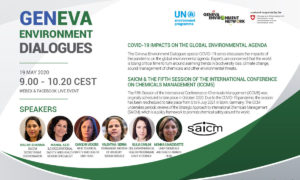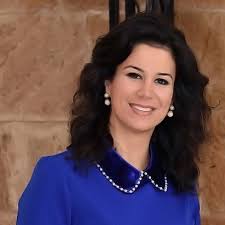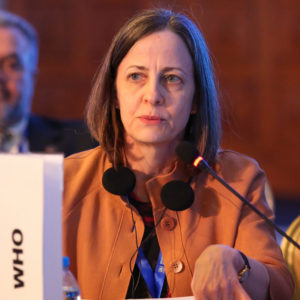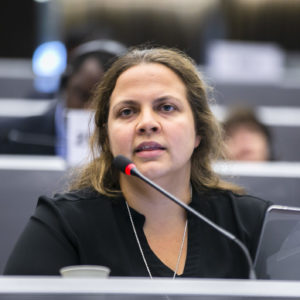Event Conference
GENeva Environment Dialogues | SAICM & ICCM5

19 May 2020
09:00–10:20
Venue: Live | Webex Event & Facebook
Organization: Geneva Environment Network
The Fifth Session of the International Conference on Chemicals Management (ICCM5) was originally scheduled to take place in October 2020. Due to the COVID-19 pandemic, the session has been rescheduled to take place from 5 to 9 July 2021 in Bonn, Germany. The ICCM undertakes periodic reviews of the Strategic Approach to International Chemicals Management (SAICM), which is a policy framework to promote chemical safety around the world.
About the GENeva Environment Dialogues
The GENeva Environment Dialogues’ special COVID-19 series discusses the impacts of the pandemic on the global environmental agenda. Experts are concerned that the world is losing critical time to turn around alarming trends in biodiversity loss, climate change, sound management of chemicals and other environmental threats.
The series addresses the following topics:
- The impact of the crisis on the invited organization activities
- The response of the invited organization to the COVID-19 crisis
- The impacts on the preparations of the conferences and negotiations they are hosting
- New schedules and programmes for these conferences and negotiations
Speakers
Facilitators: GEN Team

Nalini SHARMA
Head, SAICM Secretariat

Manal AZZI
Senior Specialist on Occupational Safety and Health. International Labour Organization

Carolyn VICKERS
Head, Chemical Safety and Health Unit World Health Organization

Valentina SIERRA
Permanent Mission of Uruguay to the UN in Geneva (ICCM5 Bureau)

Giulia CARLINI
Staff Attorney, Environmental Health Program, Center for International Environmental Law

Monika GAIL MACDEVETTE
Chief, Chemicals and Health Branch, UNEP
Summary
Welcome
Moderation: Diana Rizzolio, Geneva Environment Network
The Geneva Environment Network has the pleasure to welcome you today virtually for a new session of the Geneva Environment Dialogues, focused on the impacts of the COVID-19 pandemic on the global environmental agenda. This new series of events will take place bi-weekly and is aimed at keeping you informed on the latest developments of major upcoming negotiations.
The COVID-19 pandemic is a health crisis that affects everyone, and that has an important economic impact on top of the human suffering caused by the disease itself. There is a large response from the UN system and other actors to this crisis, including on the global environmental agenda, as we have heard in the previous sessions.
In the past weeks the Secretary General of the United Nations has various times referred to the COVID-19 pandemic as “an unprecedented wake-up call”. The pandemic is resulting in major economic and political shifts around the globe which are giving the international community a unique window of opportunity in which recovery plans can be instrumental in creating a more sustainable and resilient future. As we recover, we must build back better for people and for the planet. The Secretary General keeps also reminding us, that we have a framework for action – the 2030 Agenda for Sustainable Development and the Paris Agreement on Climate Change.
Today we will discuss the impact of this crisis on the sound management of chemicals beyond 2020 and more particularly on the upcoming Fifth Session of the International Conference on Chemicals Management, which we will refer to as ICCM5. This conference was one of the major environmental negotiations scheduled to take place this year, and that has now been rescheduled to take place next year.
The ICCM undertakes periodic reviews of the Strategic Approach to International Chemicals Management referred to as SAICM, which is a policy framework to promote chemical safety around the world, adopted in Dubai, in 2006. The Strategic Approach supports the achievement of the goal agreed at the 2002 Johannesburg World Summit on Sustainable Development of ensuring that, by the year 2020, chemicals will be produced and used in ways that minimize significant adverse impacts on the environment and human health.
It acknowledges the essential contributions of chemicals in the current societies and economies, while recognizing the potential threat to sustainable development if chemicals are not managed soundly. SAICM includes Governments, NGOs, with representatives from industry and civil society. Its secretariat is hosted by the United Nations Environment Programme.
Impact of COVID-19 on SAICM and ICCM5
Nalini Sharma, Senior Coordinator, SAICM Secretariat
- Started as SAICM coordinator in March 2020
- SAICM work is connected to the pandemic – issue of waste management
- Need for a strong SAICM Beyond 2020 for protecting human and environmental health
- Policy framework established in 2006
- multisectoral – multistakeholders approach
- coordination
- capacity building in countries
- addressing emerging issues and chemicals across the lifecycle
- ICCM5 – 5-9 July 2021 in Bonn, Germany
- IP4 (Fourth meeting of the intersessional process) considering sound management of chemicals and waste beyond 2020, planned for March 2020 in Bucharest, Romania, was postponed
- Discussions on dates for IP4 are still ongoing
- ICCM key functions: implementation, promotion of chemicals management, financing, engagement, knowledge sharing, EPIs
- 2020 is an important milestone – what are the key challenges for SAICM Beyond 2020?
- raise political attention
- national and regional implementation
- maximize engagement with stakeholders
- sufficient financing
- linkages to other agendas (biodiversity, climate change, …)
- Objectives of SAICM Beyond 2020: knowledge generation and sharing, national implementation, financing, addressing issues of concern, innovation and sustainable solutions
Valentina Sierra, Permanent Mission of Uruguay to the UN in Geneva (ICCM5 Bureau)
- Important to keep momentum going
- Still one year to continue working to prepare ICCM5
- Finalize the recommendations we have been working on during the intersessional process
- Need for solid proposals for:
- Criteria for selection of new issues of concern
- Targets
- Improving multistakeholders engagement
- Implementation mechanisms
- Zero draft of ICCM5 high-level declaration
- IP4 rescheduled
- Important negotiation meeting – moving forward assuming it will take place
- Romania still available to host the meeting
- 3 options:
- reschedule for early March 2021 in Bucharest, Romania
- reschedule for early March 2021, back-to-back with UNEA5, in Nairobi, Kenya
- reschedule for early July 2021, back-to-back with ICCM5, in Bonn, Germany
- Desirable option for finalizing recommendations for Beyond 2020:
- Undertake work on key issues through a variety of means, the outcomes of which will be discussed and finalized at rescheduled IP4
- small virtual working groups with regional and sectorial participation
- open online briefings
- submission of written comments
- additional virtual technical briefings
- Undertake work on key issues through a variety of means, the outcomes of which will be discussed and finalized at rescheduled IP4
- Request for inputs on the proposals
Sound management of chemicals beyond 2020 and the world of work
Manal Azzi, Senior Specialist on Occupational Safety and Health. International Labour Organization
- IOMC (Inter-Organization Programme for the Sound Management of Chemicals) – important role – brings together FAO, ILO, UNDP, UNEP, UNIDO, UNITAR, WHO, World Bank, OECD
- Active in SAICM intersessional work as well as Beyond 2020
- Need for strong and meaningful multisectoral and multi-stakeholders in the Beyond 2020 framework
- Why ILO is important in the field of chemicals?
- Human health – workers are exposed to chemicals along the entire supply chain
- Bring the Tripartite International Labour standards framework into the chemicals’ management framework + Tripartite Codes of Practice – stakeholders’ engagement
- Many departments of ILO work on chemicals
- ILO encouraged participation of labour sector in management of chemicals, specifically in IP3
- Need for harmonization and cooperation between world of work and chemicals’ management
Sound management of chemicals beyond 2020 and the health sector
Carolyn Vickers, Head, Chemical Safety and Health Unit World Health Organization
- WHO and WHA started preparations for SAICM Beyond 2020
- WHA Resolution 69.4 in 2016 – implement SAICM and work on a roadmap for Beyond 2020
- Roadmap approved in 2017, during WHA70
- WHO Chemicals Roadmap – concrete actions where the health sector has a lead or important supporting role
- 4 action areas:
- risk reduction
- knowledge and evidence
- institutional capacity
- leadership and coordination
- Ultimate objective is the achievement of SDG 3, 6 and 12
- Establish a global chemicals and health network – national ministries network to facilitate the implementation of the roadmap
- Health sector is critical in the arrangements of SAICM Beyond 2020
- One of key drivers is the impact of chemicals on health, in particular the figure that at least 1.6 million deaths could be prevented by the sound management of chemicals and waste
- In the context of COVID-19, the health sector has more time to prepare better for ICCM5
- Health ministries are engaged on COVID-19 response
- Chemicals in the context of the pandemic have been central – disinfection, poisoning, industrial accidents
- WHO Director-General was required to report to WHA74 on the implementation of the roadmap and on the IP4 and ICCM5
The High Level Ambition Alliance
Valentina Sierra, Permanent Mission of Uruguay to the UN in Geneva (ICCM5 Bureau)
- High Ambition Alliance for chemicals and waste
- Established in July 2018 as a platform for dialogue and facilitation – jointly facilitated by Uruguay and Sweden
- Raise awareness and ensure commitment for action on chemicals and waste management
- Important to highlight the benefits of the sound management of chemicals and waste to protect human and environmental health, for a green recovery, for resource efficiency and for sustainable development
- Support the Beyond 2020 process and the adoption of a new ambitious framework at ICCM5 as well as at the highest political level
- Planned a high-level meeting at the margins of UN Ocean Summit, which was suspended
- Working closely with Sweden to continue the work of the Alliance
Sound management of chemicals beyond 2020 and the civil society
Giulia Carlini, Staff Attorney, Environmental Health Program, Center for International Environmental Law
- In-person meetings and related challenges:
- BRS COPs & ICCM5 – scheduled in July 2021 and in Europe – not fair for non-European participants – proposing postponement of BRS COPs
- IP4 – contingency plan? – consultation on how to move forward with the process
- Online process
- meaningful and effective participations
- Virtual Working groups
- representative of regions and sectors
- plan to identify representative in advance
- Technical briefings
- replication for different time zones
- include other stakeholders as hosts/co-organizers
- keep SAICM website updated
- Other suggestions
- ICCM5 high-level declaration: good to get started on that, identify representatives, and include references to Dubai Declaration
- UNEA5 in February 2021 will happen before ICCM5 – opportunity to include chemicals and waste in the Ministerial Declaration and on a possible resolution
Nalini Sharma, Senior Coordinator, SAICM Secretariat
- Good that stakeholders propose
- Meetings back-to-back with BRS OCPs is being discussed
- Welcome the support of the High Ambition Alliance
Sound management of chemicals and UNEP Response to COVID-19
Monika Gail MacDevette, Chief, Chemicals and Health Branch, UNEP
- UNEP has a major role in the response to COVID-19
- Number of factsheets and information on what UNEP is doing
- Priority in three areas:
- management of medical waste
- zoonotic diseases
- green fiscal stimulus packages
- Embracing the 2030 Agenda for Sustainable Development, by making sure that environment, society and economic activity are considered
- For today’s discussion, the management of medical waste is essential
Questions
Roya Gorjifard
- Have there been any activity on extra using of disinfections and alcohol-based substances for disinfection during covid-19 for health care workers?
Walter Schuldt, Permanent Mission of Ecuador
- Excellent presentations. In the coordination with other Int. Organizations and relevant actors, in preparation to SAICM5, has there be any engagement with the UN Special Rapporteur on hazardous substances and wastes (SR Toxics)?
Yves Lador, Earthjustice
- How will ICCM5 relate to the biodiversity issues ?
Answers
N. Sharma
- Activities ongoing with biodiversity-related Conventions
- Where can we join efforts?
- In relation to targets and indicators or to the Post-2020 biodiversity and Beyond 2020 SAICM?
- SAICM Beyond 2020 + biodiversity Post-2020 – discussion on linkages in ongoing
C. Vickers
- World Health Organization has published extensive guidance related to disinfection and on alcohol-related infection control
- Increase in chemicals’ incidents in relation to COVID-19 – alcohol consumption increased as well as poisonings related to alcohol contaminated with ethanol
- Stress and mental health are an issue as well in this period
M. Azzi
- There have been chemical accidents because of poor or non-existent planning
- ILO is working on procedures and protocols for the safe return to work
- Recognition of COVID-19 as an occupational disease
- ILO developing workplace level in mental health tools, in cooperation with WHO
- The Special Rapporteur on hazardous substances and wastes has been engaged for workers’ rights
- He brought to the forefront the issue of protecting workers from COVID-19 and chemicals
- The SR Toxic has been heavily engaged with SAICM and ICCM5
- The SR Toxics mandate will end in July 2020 – his mandate has focused on workers and that has helped ILO’s mission
C. Vickers
- Throughout his mandate he joined IOMC meetings to give inputs and have discussions
- Part of an ongoing dialogue that we hope can continue
N. Sharma
- Have been engaging with SR Toxics
- Planned art exhibition at the Palais des Nations for World Environment Day where the SR Toxics would have been the key speaker
- No information about what happens when the mandate ends in July 2020
M. Gail MacDevette
- Engagement with the SR Toxics – will continue to be engaged
- Widespread need for coordination among agencies, a role that the SR Toxics has played
Jacqueline Alvarez, Chemicals and Health Branch, UNEP
- Work in progress, but there is a big opportunity to connect Chemicals and Waste and biodiversity
- IPBES report highlighted that cost of loss of biodiversity is pollution and chemicals
- How to proceed?
- Working on two channels:
- understanding in both framework of the relevance of each other
- implementation: what activities can coordinate better these two clusters?
- Biodiversity loss and pollution, especially related to chemical substances such as pesticides and fertilizers, have been cooperating, but there are more opportunities of cooperation
- For instance: Artisanal Small-scale Gold Mining, focus of the Minamata Convention on Mercury, brings chemicals, human health, biodiversity loss and environmental degradation together
- Paper talking about the different aspects of connection between biodiversity and chemicals
N. Sharma
- Working very closely with the Minamata Convention on Mercury Secretariat and the BRS Secretariat
Closing remarks
Monika Gail MacDevette, Chief, Chemicals and Health Branch, UNEP
- Very important area
- We are in unprecedented times – it took a pandemic to bring us all together
- Individual mandates – we all need to come together because there are huge expectations from member states
- Looking at the future of SAICM Beyond 2020
- Need to look at maintaining the momentum that has been build up in several years
- Engage and make sur that we address the multi-faceted problems we are faced with
- Looking beyond our own boundaries
- Partnerships, looking at the nexus among our different mandates, are essential
- Raising awareness and communication is essential
- Look at the investment the word has made in the past – bring it into play
- Need to be raising ambition and act decisively
- Expertise in working virtually – incorporate it in our future meetings and in ICCM5 (participate virtually instead of travelling, improve work-life balance, …)
- Actions all around the world to manage chemicals
- SAICM approach is multisectoral and multi-stakeholders – rich discussion on something that has a human, societal and environmental impact
- Partnerships, raising awareness, provide best available knowledge, actions are key
Documents
- Nalini Sharma and Valentina Sierra Presentation
- Manal Azzi Presentation
- Carolyn Vickers Presentation
- Giulia Carlini Presentation
Video
The event was live on Facebook.
Links
SAICM
- SAICM Secretariat
- ICCM5
- Chemicals Without Concern
- Assessment on linkages with other clusters related to chemicals and waste management and options to coordinate and cooperate on areas of common interest (SAICM/IP4/INF/3)
- Future Policy Award for the Protection from Hazardous Chemicals
UNEP
WHO
ILO Occupational Health
- Prevention and Mitigation of COVID-19 at Work ACTION Checklist
- Press Release | World Day for Safety and Health at Work 2020 – Stop the pandemic: Safety and health at work can save lives
- Report for World Day for Safety and Health at Work 2020
- Webinar recording: Stop the pandemic: Safety and health at work can save lives
- Good jobs to minimize the impact of COVID-19 on health inequity
- Work at the sharp end: Human factors/ergonomics for protecting healthcare workers and patients
- Work from home: Human factors/ergonomics considerations for teleworking
- Covid-19: How do OSH professionals impact public-policy
- The new world battleground with Covid-19: Challenges, partnerships, impact and business
UN Human Rights – SR Toxics
- Deadly gas leak in India, grim wake-up call for global chemical industry: UN rights expert (14 May 2020)
- “Every worker is essential and must be protected from COVID-19, no matter what” – UN rights experts (18 May 2020)
